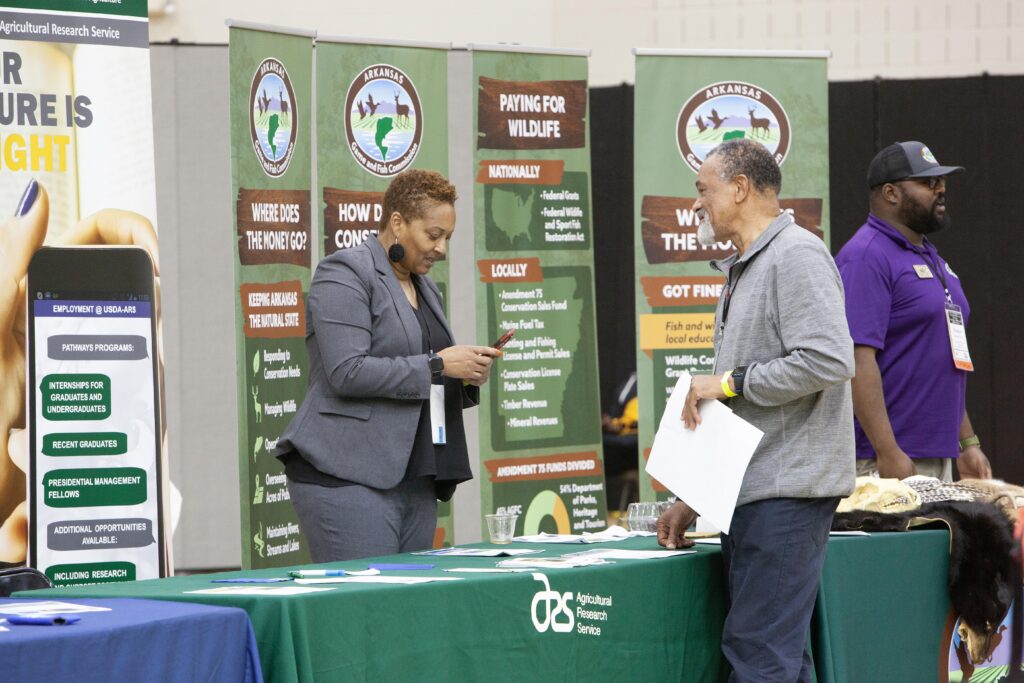The conference featured various workshops on trending agriculture and family and consumer sciences topics.
The 65th Annual Rural Life Conference, a cornerstone event for the agricultural community in Arkansas, was held on March 15 at the University of Arkansas at Pine Bluff’s Health, Physical Education and Recreation Complex.
Sponsored by the School of Agriculture, Fisheries and Human Sciences, this year’s conference attracted around 300 participants, including farmers, landowners, educators, students and agency representatives from across the state.
Since its inception in 1950, the conference has become a springtime tradition, offering a platform for sharing advancements and knowledge in agriculture, family and farming management and enterprise development.
This year’s theme, “Legacy Opportunities for Community Service and Outreach – Connecting, Collaboration, and Commitment,” aimed at addressing the multifaceted challenges faced by the farming community, promoting an array of educational and collaborative solutions.
The conference featured presentations by guest speakers, several workshops and breakout sessions, a special forum for high school students interested in agriculture fields, a legal clinic and immediate assistance for their property owners, live demonstrations and a poster session highlighting research projects and exhibits by government and community-based agencies.
Reflecting on this year’s conference, UAPB Chancellor Laurence B. Alexander emphasized the event as an opportunity to improve our community through collaboration and dedication.
“Through our collaborative endeavors, we are able to help build a stronger state and nation through our connection, collaboration, and commitment to shaping the minds that one day will reshape the world,” Alexander said.
USDA is one of the key participants in the conference, giving information and timely updates on the USDA Natural Resource Conservation Stewardship Program (CSP) for private landowners working to achieve their conservation and management goals and the Environmental Quality Incentives Program (EQIP). USDA CSP Coordinator Sherri DeGraphenreed noted that these initiatives are intended to improve environmental quality and agricultural operations.
DeGraphenreed said in a conference program, “Using these programs can lead to cleaner water and air, healthier soil and better wildlife habitat, all while improving agricultural operations.”
One of the conference’s highlights was the High School Students Forum, one of the USDA’s NextGen initiatives to cultivate and sustain the next generation of the food, agriculture, natural resources and human sciences.
USDA Liaison Belinda Demmings said the forum “was an opportunity for students to engage with USDA’s top professionals and for UAPB to recruit degree-seeking students in the FANRHS fields and related fields such as computer science, general biology and business.”
“Students should have gotten a snapshot of various professional pathways to USDA workforce such as meaningful paid internships, fellowships, and job opportunity matching,” Demmings said. “I believe the 65th UAPB Rural Life Conference accomplished the goal of bringing communities of learners together to engage our Next Gen.”
Tyler Garlington, a junior in Agriculture Engineering at UAPB and a USDA/1890 National Scholar, said, “The conference allowed me to share my experience and reach out to young high school students. I was able to network with many different vendors and make connections at the conference.”
Isaiah Solomon, a graduate student in Agricultural Regulations, said the conference was an opportunity to network and learn about the latest research in agriculture. He and his advisor, Yong Park, an associate professor in entomology, set up a booth where they displayed a unique way to add value to sweet potato wine.
“It is especially important for farmers to make new markets of income on crops and add more economic value to their farms,” Solomon said.
Attendees also had an opportunity to learn about drone technology and its potential application for farm use and agricultural management. Hands-on drone usage was given to the participants.
Other workshops aim to strengthen local individuals, families and communities. Some of these include crafting local food systems that benefit all, emerging trends in rural development, stretching food dollars, maximizing tax returns, creating efficient business structures and ensuring mental wellness.
The conference also covered diverse topics by distinguished keynote speakers who provided attendees with a comprehensive understanding of the challenges and opportunities in today’s agriculture.
The Luncheon Speaker, Philip J. Haynie, III, the CEO of Haynie Farms, LLC in Reedville, Virginia, shared his experience as a Black row-crop farmer and talked about the effect of discriminatory heir’s property laws on Black land ownership.
The conference was free to producers, students, veterans, homemakers and retirees.
